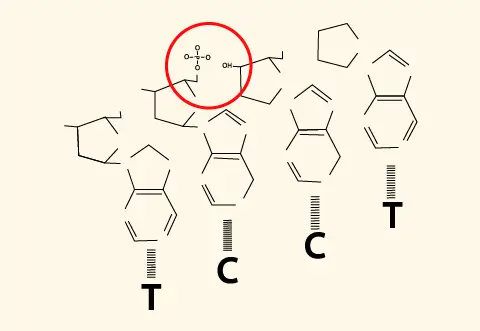
What Reagents are needed for a typical Polymerase Chain Reaction (pcr)?
A chemical reagent or simply a reagent could be a compound or blend included to a framework/system to cause a chemical response or test if a response happens.
There are typically six categories of reagents that are required for a successful progression of polymerase chain reaction/PCR.
What Reagents are needed for a typical Polymerase Chain Reaction (pcr)?
- DNA Ligase
- Taq Polymerase
- 4 Nucleotides (A,T,G,C)
- Two primers
- 5 Nucleotides (A,T,G,C,U)
- DNA Template
- DNA Polymerase
DNA Ligase:
DNA ligase is an enzyme that is capable of joining two distinct DNA strands together, the word ligation means joining strands. DNA ligase can possibly connect DNA when the phosphate is joined to the 5′ phosphate, as demonstrated in the image.
The ligase execute the reaction to simply tie the phosphate to nearest sugar, initiating the general backbone of DNA. It can fix a break in the DNA spine or a total break between two distinct DNA particles.
Taq Polymerase:
It is employed to synthesize target DNA strand for certain applications. It is a kind of thermostable DNA polymerase, can work at higher temperature also.
Nucleotides:
Nucleotides as we know are the building material for the DNA. They are ligated sequentially by the DNA ligase protein to make the new DNA strand of the interest.
Two Primers:
These are short single-stranded DNA chunks of about 15-30 nucleotides in extension. that are corresponding to DNA successions that flank the objective locale of interest.
Primers function to facilitate with a free 3′ (-OH) set to which polymerase can attach dNTP’s.
DNA Template:
DNA template is the mandatory part in the PCR as without them PCR performance cannot be imagined.
The new DNA sections that are manufactured throughout PCR likewise fill in as formats to which the DNA polymerase compound can append and begin making DNA. The outcome is enormous duplicates of the particular DNA section created in a generally brief timeframe.
DNA Polymerase:
Because of its vital job in combining and intensifying new DNA strands, DNA Polymerase is crucial for Polymerase Chain Reaction . Like other DNA polymerases, Taq Polymerase can possibly deliver DNA in the event that it has a primer, a short succession of 20 nucleotides that give a beginning stage to DNA combination.
Conclusion:
All these take their part as reagent in the PCRsystem and play very crucial role in replicating the DNA strand. Without all these replication or PCR cannot be carry out.